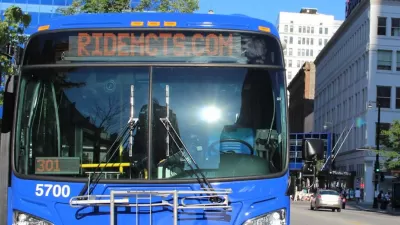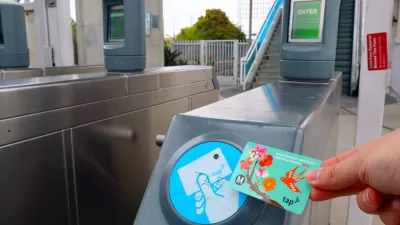Cashless fare options let agencies enable fare capping, track rider behavior, and eliminate proprietary fare cards.

In an article for GovTech, Skip Descant describes how cashless fare payment technology on public transit is changing the way transit agencies collect fares, enable fare capping, and speed up service.
According to Descant, “Fare-capping is often championed by transportation equity advocates as a way to corral runaway transit costs for low-income riders, since fares are capped at a certain amount for a set duration of time.” Technology now enables fare capping that wasn’t possible with cash payments. “But open loop systems can go beyond fare-capping to provide rich caches of data that officials can use to design incentives, loyalty programs and even routes,” Descant adds.
Newer fare payment systems also offer ‘open loop’ payments, meaning riders can use any debit or credit card to pay rather than a system-specific card. “New developments in areas like digital driver’s licenses could be made interoperable with digital fare payment systems to quickly and accurately validate data like age, disability or veteran status — all of which are often linked to transit discount programs.”
A 2022 study from the University of Oregon revealed a need for a cash payment option, however, noting that many of the people who depend on transit the most are still more likely to be unbanked.
FULL STORY: Tap-To-Pay Transit Tech Is Cash-Poor, but Rich in Data

Trump Administration Could Effectively End Housing Voucher Program
Federal officials are eyeing major cuts to the Section 8 program that helps millions of low-income households pay rent.

Planetizen Federal Action Tracker
A weekly monitor of how Trump’s orders and actions are impacting planners and planning in America.

Ken Jennings Launches Transit Web Series
The Jeopardy champ wants you to ride public transit.

Washington Legislature Passes Rent Increase Cap
A bill that caps rent increases at 7 percent plus inflation is headed to the governor’s desk.

From Planning to Action: How LA County Is Rethinking Climate Resilience
Chief Sustainability Officer Rita Kampalath outlines the County’s shift from planning to implementation in its climate resilience efforts, emphasizing cross-departmental coordination, updated recovery strategies, and the need for flexible funding.

New Mexico Aging Department Commits to Helping Seniors Age ‘In Place’ and ‘Autonomously’ in New Draft Plan
As New Mexico’s population of seniors continues to grow, the state’s aging department is proposing expanded initiatives to help seniors maintain their autonomy while also supporting family caregivers.
Urban Design for Planners 1: Software Tools
This six-course series explores essential urban design concepts using open source software and equips planners with the tools they need to participate fully in the urban design process.
Planning for Universal Design
Learn the tools for implementing Universal Design in planning regulations.
Heyer Gruel & Associates PA
Ada County Highway District
Institute for Housing and Urban Development Studies (IHS)
City of Grandview
Harvard GSD Executive Education
Toledo-Lucas County Plan Commissions
Salt Lake City
NYU Wagner Graduate School of Public Service





























